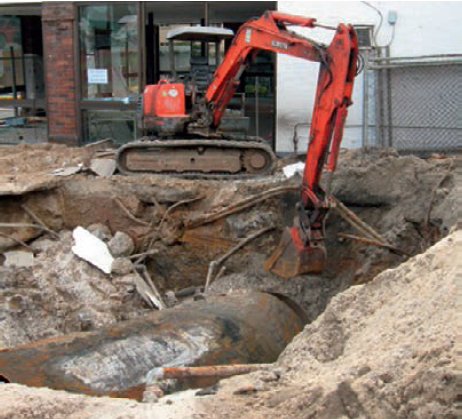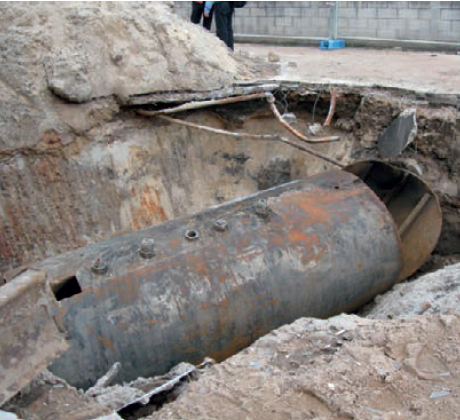Potential risks when removing underground storage tanks: Safety alert
This safety alert about the potential risks when removing underground storage tanks (UST’s)
This safety alert reminds persons conducting a business or undertaking (PCBU's) of the potential risks when removing underground storage tanks (UST's) that have previously contained flammable or combustible liquids – eg petroleum products, or flammable gases.
Background
WorkCover NSW recently responded to an incident where an explosion occurred during the removal of a UST that had previously contained unleaded petrol. The explosion injured three workers and seriously damaged surrounding properties.
At the time of the explosion two workers were standing next to an excavated pit where the UST was still in place, while a third worker was operating an excavator on the other side of the pit. The excavator was being used to remove the UST from the pit, without the use of chains or lifting lugs on the steel tank, when the explosion occurred.


Contributing factors
The incident occurred as a result of an ignition source being introduced into a hazardous area where a fire or explosion could occur.
Other contributing factors include:
- At the time of the incident, a small amount of unleaded petrol remained in the bottom of the tank creating a potentially hazardous area.
- The tank had not been freed of hazardous chemicals when the fuel dispensers and vent pipes were removed.
- There was no air monitoring to check for flammable vapours in the explosive range while the work was being carried out.
- An inappropriate method was used to try and free the UST of the hazardous chemicals – ie 'gas free' the UST.
- An inappropriate method was used to try and lift the UST out of the pit.
- The sub-contractor engaged to carry out the work had no previous experience removing UST's.
Action required
Any work on old tanks and piping is potentially dangerous and should be carried out by experienced persons in accordance with safety and work permit procedures.
WorkCover licensed demolition contractors are authorised to carry out decommissioning, abandonment or removal of UST's that have contained flammable or combustible liquids. Contractors with a restricted demolition licence are not authorised to do demolition of chemical installations unless they have made an application for an upgraded restricted demolition licence that authorises demolition of chemical installations.
PCBU's should ask for written confirmation that the work will be completed by a WorkCover licensed demolition contractor who is not restricted for demolition of chemical installations.
Abandoned tanks
An abandoned tank is an underground, partially underground or fully mounded tank that has not been used to store flammable liquid for two years, or not intended to be used again.
Workplaces that have an abandoned UST that has been used to store flammable and/or combustible liquids, or flammable gases must notify WorkCover. The system must be removed if it is no longer in use. Where this is not reasonably practicable, the risk must be controlled by decommissioning the tank in accordance with Australian Standard AS 4976-2008.
Specific control measures
The PCBU must identify reasonably foreseeable hazards and suitable control measures before commencing the decommissioning, abandoning, removal and/or disposal of a UST that has contained flammable or combustible liquids or flammable gases.
Where the possibility of a hazardous atmosphere has been identified, atmospheric testing and monitoring using an appropriate gas detector should be carried out to ensure a safe work area is maintained.
Controls should be in place to ensure that ignition sources are not introduced into a hazardous area. The area should also be kept free of any of the possible sources of ignition.
Workers should never puncture a storage tank that has not been degassed and should always use the correct size machinery to lift tanks out of the ground.
Further information
Call WorkCover on 13 10 50
For guidance on the safe removal and decommissioning of UST's refer to:
- Work Health and Safety Regulation 2017
- Australian Standard AS 4976-2008: The removal and disposal of underground petroleum storage tanks
- Australian Standard AS 1940-2004: The storage and handling of flammable and combustible liquids
- Australian Standard AS/NZS 60079.10.1: Explosive atmospheres – Classification of areas – Explosive gas atmospheres
- Australian Standard AS/NZS 60079.29.1: Explosive atmospheres – Gas detectors – Performance requirements of detectors for flammable gases
- Code of practice – Demolition work
- Code of practice – Excavation work
- Application to amend a restricted demolition licence form
- Australian Petroleum Contractors and Suppliers Association (APICSA) apicsa.com.au
- Australasian Institute of Dangerous Goods Consultants (AIDGC) aidgc.org.au
This alert contains safety information following inquiries made by WorkCover about an incident or unsafe practice. The information contained in this alert does not necessarily include the outcome of WorkCover's response to an incident or unsafe practice. WorkCover does not warrant that the information in this alert is complete or up-to-date and does not accept any liability to any person because of the alert's information or its use.
Catalogue No. WC01188 SafeWork NSW 0715